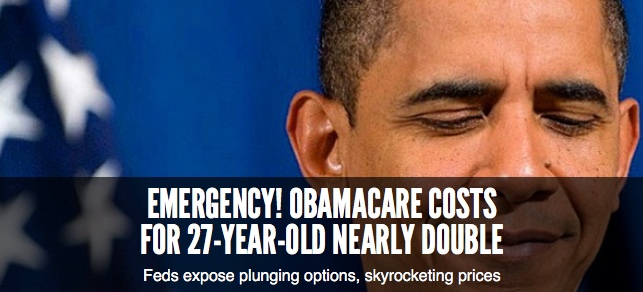Bob Unruh ramped up the scare tactics in a Nov. 1 WorldNetDaily article:
Obamacare costs for a 27-year-old on a benchmark plan have exploded from $2,616 during the program’s first year to nearly double, at $4,932, for the plan year 2018, according to a new report.
The documentation from the office of the Assistant Secretary for Planning and Evaluation in the Health and Human Services Department reveals the extent of problems Americans face if Congress is not successful in repealing and replacing Barack Obama’s signature legislation.
The numbers reveal the failings: a 37 percent average premium increase in the benchmark plan, the fact eight states have only one issuer offering plans under an Obamacare exchange and the plunge from 237 issuers nationwide a year ago to 132 now.
But it’s not until the final paragraph of his 18-paragraph article — after a lot of bashing of Obamacare that Unruh gets around to mentioning a certain mitigating factor:
“A 27-year-old with a household income of $25,000 could receive an APTC [advance premium tax credit] of up to $273 for PY18, a 73 percent increase from PY17 ($158) based on the average premium for the benchmark plan across all HealthCare.gov states,” the report said. “A family of four with a household income of $60,000 could receive an APTC of up to $1,088 for PY18, a 60 percent increase from PY17 ($678) based on the average premium for the benchmark plan across all HealthCare.gov states.”
That’s worded poorly — and Unruh may have intentionally left it that way to hide the truth — but the point is that subsidies will offset much of the cost of the policy for lower-income enrollees. An actual news outlet, CNN, explains this much more clearly that Unruh could ever be bothered to do:
The big rate increase means premium subsidies will rise 45%, on average, to $6,660 a year. More than eight in 10 enrollees receive premium subsidies, which reduce their cost to less than 10% of their household income.
A 27-year-old making $25,000 a year could receive an annual subsidy of nearly $3,300. That would bring his or her premium down to $1,650 a year if he or she enrolls in the benchmark silver plan.
A family of four earning $60,000 a year could get an annual subsidy of $13,000, bringing their benchmark plan premiums down to just over $4,750.
Thihs is just bad, politically motivated stenography. It’s been a long, hard fall for someone who used to have journalistic credibility as an former Associated Press employee.
